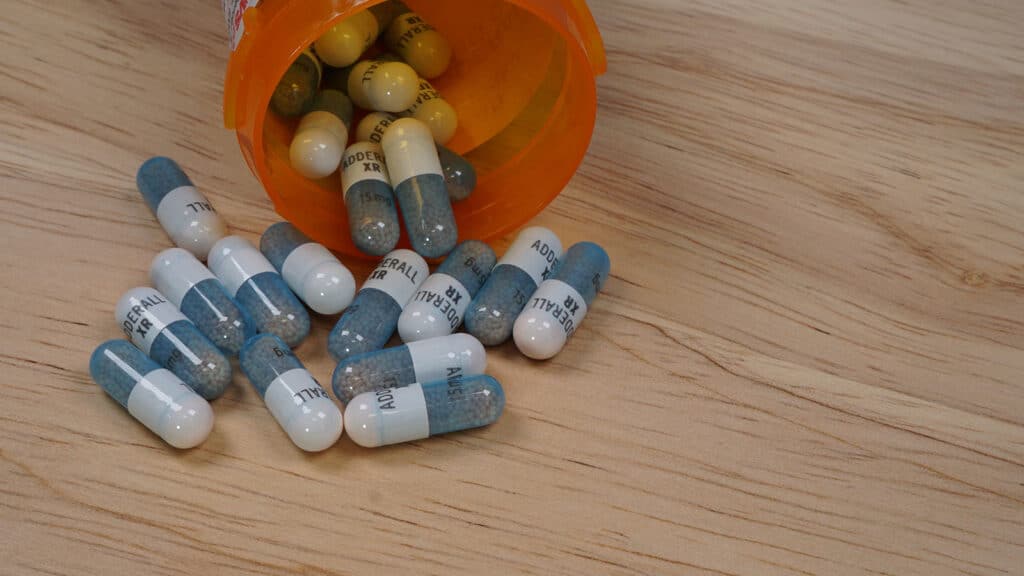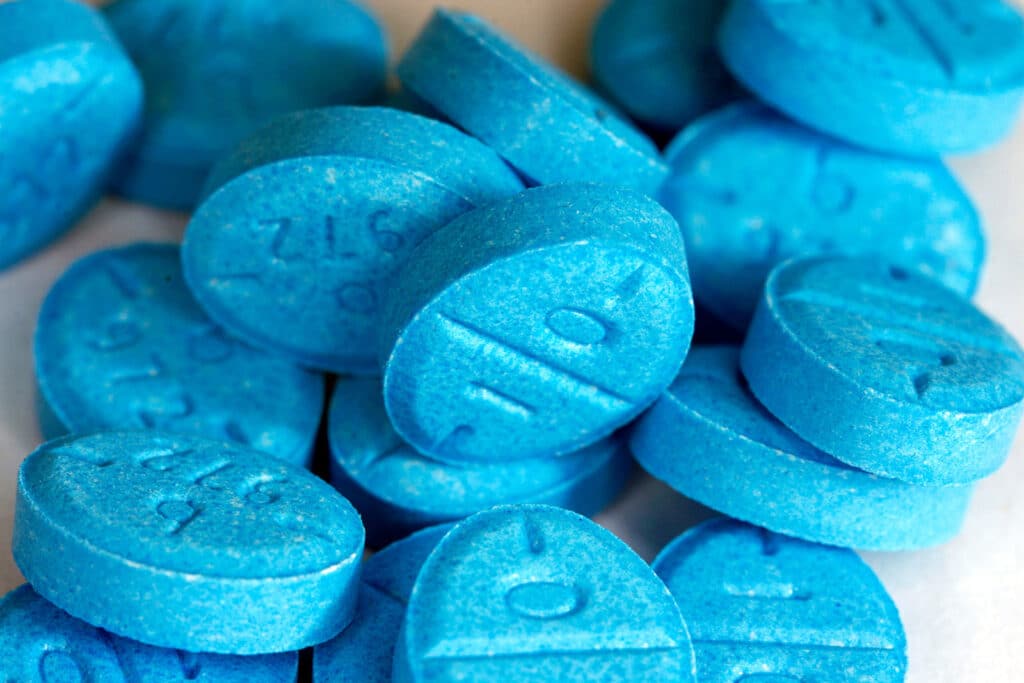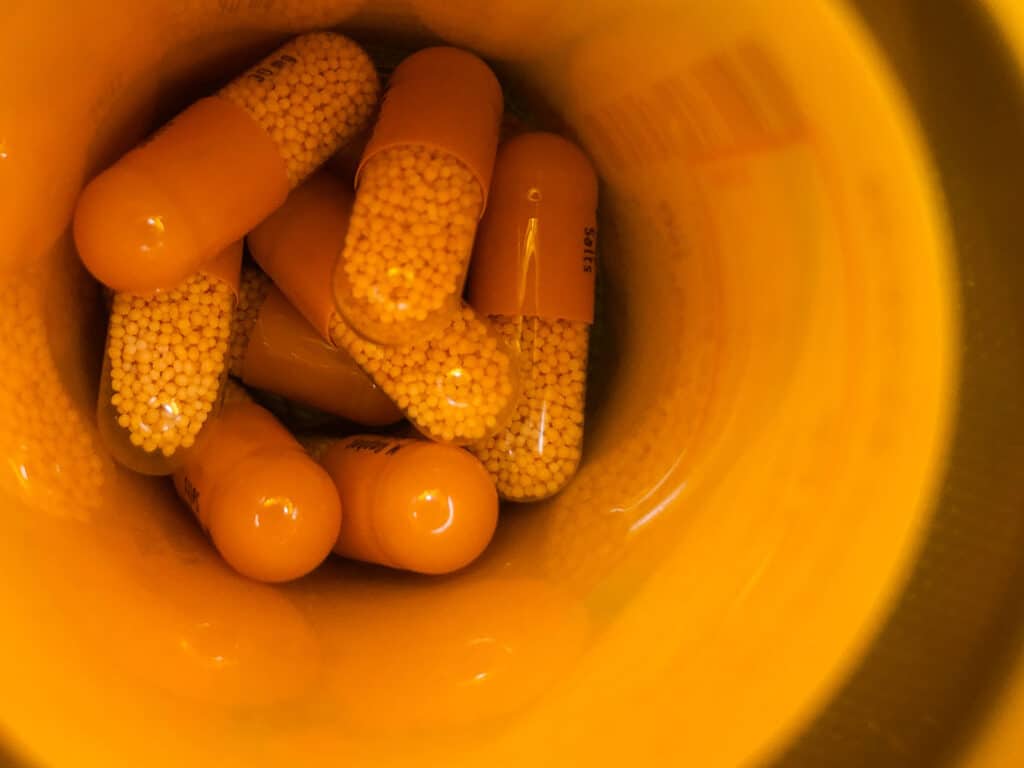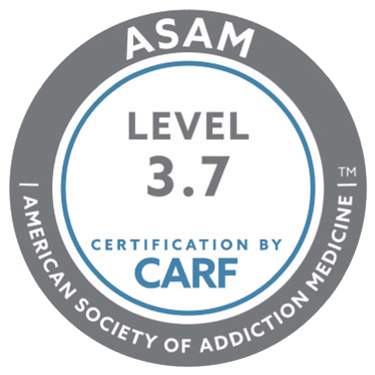Adderall is the trade name of a drug that belongs to a prescription medication class called “stimulants”. The drug is available in the form of tablets containing a mixture of amphetamine salts.

Under normal conditions, the drug stimulates the central nervous system to improve concentration and focus in ADHD patients.
However, Adderall is also quite addictive with a high potential for dependence and abuse, which is why it’s a controlled drug in the U.S.
Despite being a complicated process, Adderall addiction treatment is achievable, and in this guide, we’ll walk you through everything you need to know to get your loved ones the help they need.
How Does Adderall Work?
As the name suggests, patients suffering from Attention Deficit Hyperactivity Disorder or ADHD are pretty impulsive, so they find it extremely difficult to concentrate on tasks or stay motionless for a while.
In most cases, these symptoms occur due to relatively low levels of dopamine. This one is a brain chemical responsible for various feelings, including pleasure and satisfaction, which pushes ADHD patients to continuously seek external stimulation.
That’s where Adderall comes into play. The treatment works by increasing the levels of various chemicals, including dopamine, norepinephrine, and serotonin, providing the brain with the level of stimulation it needs to overcome hyper-impulsivity and lack of focus.
Besides ADHD, Adderall is also used as a treatment for narcolepsy, which is a sleep disorder that affects sleep-wake cycles and causes a chronic sensation of extreme sleepiness throughout the day.
What Is Adderall Addiction?
Adderall addiction is a form of drug misuse disorder, which is associated with the abuse of the drug to seek its stimulation and/or euphoric effect.
Due to the high similarity in chemical composition, Adderall is similar in effect to meth (methamphetamines). However, since it’s more accessible, its risk of abuse is much higher.

Adderall addiction can take many forms, including:
- Taking Adderall without a proper medical prescription to get high
- Taking Adderall beyond the prescribed period
- Re-taking Adderall without a doctor’s consultation
- Using Adderall in doses higher than prescribed
- Mixing Adderall with other drugs or alcohol
- Taking Adderall in dosage forms other than prescribed, such as injection, snorting, or smoking (to increase its effect)
Although teens and young adults are the most affected by Adderall addiction, it’s not limited to any demographic, and any person taking Adderall is at risk of developing misuse problems.
How Common is Adderall Addiction?
Adderall and methamphetamine addiction is quite high. According to a John Hopkins University study, non-prescription use of Adderall among adults increased by up to 67% between 2006 and 2011.
The Substance Abuse and Mental Health Services Administration also ranks amphetamines as one of the most commonly abused/addicted drugs, affecting over 16 million people since it was invented in the 20th century and over 2.55 million in 2020 alone.
Another survey found that over 66% of young adults who abuse this prescription drug get it illegally from their friends and don’t have a proper prescription for it.
Why Adderall Addiction Treatment is Critical
Besides being highly addictive, Adderall’s stimulant effect is only safe when used as prescribed.
Excessive and prolonged use of Adderall can cause a variety of serious health problems, such as:

- Insomnia and sleep disorders
- Seizures
- Cardiovascular diseases, including a high risk of a heart attack
- Irritability and aggression
- Interacting with several other medications
- Depression and extreme mood swings
- Drug-induced psychosis
What Causes Adderall Addiction?
Although Adderall is marked as a safe treatment for ADHD and narcolepsy, the U.S. Drug Enforcement Agency classifies it as a Schedule II substance (controlled medication).
This is because Adderall is a highly potent stimulant with an incredible potential for drug abuse and addiction.
According to the Food and Drug Administration (FDA), taking Adderall for a long period causes severe dependence where the body adapts to the current dose and starts experiencing withdrawal symptoms if the medication is stopped or the dosage is reduced.
This dependence can also develop into full-on addiction where patients show compulsive urges to seek the drug, regardless of its negative symptoms.
Another reason why Adderall is subject to drug abuse comes from its effect on brain chemistry.
Since amphetamines raise dopamine, norepinephrine, and serotonin, those with stable dopamine levels will experience a sensation of euphoria “high” and hyper-excitement when they take it, especially in high doses.
Besides seeking that euphoric sensation, some people may abuse Adderall for its pharmacological effects, such as:
- Enhance their physical performance in athletic competition
- Staying awake for longer periods
- Increase their level of focus
- Lose weight by inducing appetite loss

What Are the Symptoms/Signs of Adderall Addiction?
Since Adderall has a potent stimulant effect with high dependence potential, developing addiction from recreational use can be quite fast.
Different levels of Adderall abuse can result in unique symptoms that range between subtle and obvious. Here’s a quick look at them:
Side Effects of Adderall Use
Like any medication, Adderall has some side effects. These symptoms can occur even when patients take Adderall as prescribed.
Experiencing these symptoms may require contacting your doctor but they aren’t necessarily a sign of abuse:
- Dryness in mouth
- Changes in bowel movement and diarrhea
- Difficulty of sleeping
- Mild headache
- Nervousness and anxiety
- Decreased libido
- Decreased appetite
- Faster breathing , heart rate, and higher or lower blood pressure
Immediate Symptoms of Adderall Abuse
As previously established, Adderall abuse can happen quickly, and it can still be a risk factor while taking the drug medically with a prescription.
The most common symptom of Adderall abuse is increased irritability and hyperactivity of the abuser.
However, Adderall abuse can include a variety of other symptoms and signs, many of which are an enhanced version of the common side effects, such as:
- Noticeable weight loss
- High irritability and easy panicking
- Mood swings
- Restless and uncontrollable shaking
- Insomnia
- Abdominal pain
- Inability to perform some daily tasks or stay focused
- Developing tolerance towards regular dose of Adderall and pumping the dose

Severe Symptoms of Long-term Adderall Use and Addiction
The continuous misuse of Adderall leads to dependence, which quickly develops into addiction. There are both long-term and short-term consequences of Adderall abuse. The symptoms of Adderall withdrawal and addiction are both mental and physical, which include:
- Excessive reaction towards things, mostly with anger and paranoia
- Swinging between episodes of mania and depression
- Developing suicidal thoughts
- Chest pain and difficulty breathing
- Extreme fatigue from the lack of sleep and rest
- Stunted growth due to lack of appetite, especially in teens
Besides medical symptoms, an Adderall abuser/addict will also display noticeable changes in their behavior, including:
- Fearfulness of running out of the drug
- Trying to get more prescriptions for Adderall by visiting multiple doctors
- Manipulating the tablets (for example, crushing and snorting them)
- Justifying taking a higher dose than prescribed
- Failing to complete daily tasks and responsibilities
- Skipping hobbies and sports
- Secretive behavior
- Notable changes in surrounding circles (friends)

Treatment Options for Adderall Addiction
Although Adderall addiction can be quite hard to overcome, there are various methods and treatment options that can help with substance abuse problems. In this section, we’ll take a closer look at these options and how they work:
1. Medical Detoxification
Detoxification (also known as “detox”) is the first step to preparing an individual for recovery from substance addiction.
As the name of the process suggests, this process involves the removal or withdrawal of the abused substance from the body to prevent it from interfering with the physiological functions of the body.
Technically, medical detoxification can be done simply by stopping Adderall and fighting the urge to take it.
However, quitting Adderall suddenly can be quite dangerous due to the extreme withdrawal symptoms associated with the drug, especially for heavy addiction.
Instead, for safer and more successful detoxification, the process needs medical supervision, which is why it’s usually carried out in a medical center, such as a rehabilitation facility.
2. Behavioral Therapy
Cognitive behavioral therapy is a widely used technique to treat addiction, especially in combination with other treatment options.
This treatment method works by teaching those in treatment to better control their urges and behaviors.
According to various studies, cognitive behavioral therapy also showed remarkable efficacy in treating various psychological conditions, including ones associated with addiction, such as anxiety and bipolar disorder.
3. Support Groups
Support groups are among the most effective methods to overcome addiction and are deeply associated with behavioral therapy.
Attending support groups will allow Adderall addicts to share their experiences with others who went through similar issues, and encourage them to overcome the temptation of relapsing.
Support groups also help in creating a supportive environment for participants. It’s also a part of inpatient residential treatment that is found highly effective even if they’re attended online, according to studies.
4. Medications
Technically speaking, there are no medications that directly treat Adderall addiction. Yet, the withdrawal phase can be quite uncomfortable and causes extreme discomfort to Adderall addicts.
During the withdrawal period, doctors will prescribe various medications that help manage these symptoms and reduce their impacts, such as pain and sleep medications.
Doctors will also use Adderall but in gradually decreasing doses to make the withdrawal phase less painful and more tolerable. This process is known as tapering, which can be quite necessary for high-dose addicts.

Steps to Take for Adderall Addiction Treatment
If you or a loved one is suffering from Adderall addiction, taking an initiative to overcome the addiction is quite necessary. Early intervention increases the chances of treatment success, so here are the steps necessary in that situation:
1. Seeking Professional Help
Quitting Adderall is extremely tricky due to its high addictiveness. For that reason, it’s always best that you seek professional medical help when trying to overcome addiction.
A medical professional will help by gradually decreasing the Adderall dose and providing medications to relieve the pain and discomfort associated with withdrawal symptoms as well as the professional expertise to increase the odds of success of treatment.
2. Creating an Individualized Treatment Plan
Since every case is different and highly dependent on several complex variables, creating a personalized treatment plan is highly recommended.
This plan must include aspects like medical history, risk factors, mental health assessment, triggers of abuse, goals and objectives, interventions, etc.
Luckily, medical centers can greatly help with this process, as they create a safe environment for the patient that is free from provoking factors.
3. Adhering to Treatment
Sticking to treatment, especially in the initial phases, can greatly induce the impact of the withdrawal symptoms and make them easier to tolerate.
Even if they already feel great, taking medications and attending support groups are essential for relapse prevention.
4. Maintaining Sobriety
Staying sober can be a challenge of its own, as it requires an immense level of discipline and avoiding all triggers and risk factors.
Staying in connection with your treating professional and support groups is a highly effective method to avoid returning to addictive thinking patterns.

What Are the Challenges to Expect During Adderall Addiction Treatment?
Adderall addiction treatment is not impossible but it’s a road riddled with challenges that you must overcome. Here’s a quick look at some of the most common aspects to look out for:
Withdrawal Symptoms
These symptoms vary depending on the Adderall dose and can include pain, fatigue, headache, anxiety, and sleeping disorders. The effects of these symptoms peak during the first 5 to 7 days and last up to 4+ weeks.
Co-occurring Disorders
This happens when treating Adderall addiction while suffering from existing mental illnesses, such as depression, psychosis, or ADHD.
Treating Adderall addiction while suffering from co-occurring disorders is difficult because it’s difficult to tell the source of the symptoms, which requires high experience and strict dose adjustment.
Relapse Prevention
Adderall addicts are at high risk of relapsing due to triggers. For that reason, creating a stress-free environment and proper rehabilitation is extremely crucial for the success of the treatment.

Final Thoughts
This marks the end of today’s guide that walks you through Adderall addiction and substance abuse treatment. As you can see, a combination of medical detoxification, medication, support groups, group therapy, treatment centers and behavioral therapy can go a long way during treatment. Patients can undergo treatment through residential, outpatient or partial hospitalization programs customized to meet their needs.
If you or your loved ones are suffering from Adderall addiction, you must contact a medical professional as soon as possible to receive the necessary help.
FAQ
What are the treatment options for Adderall addiction?
What are the risks of Adderall addiction?







